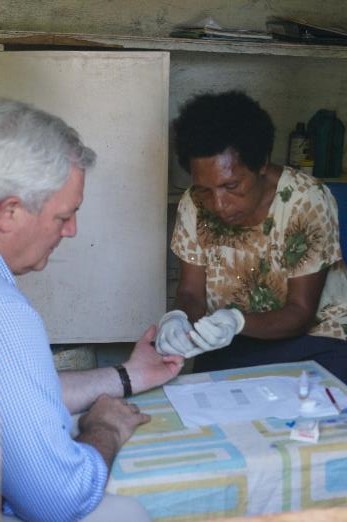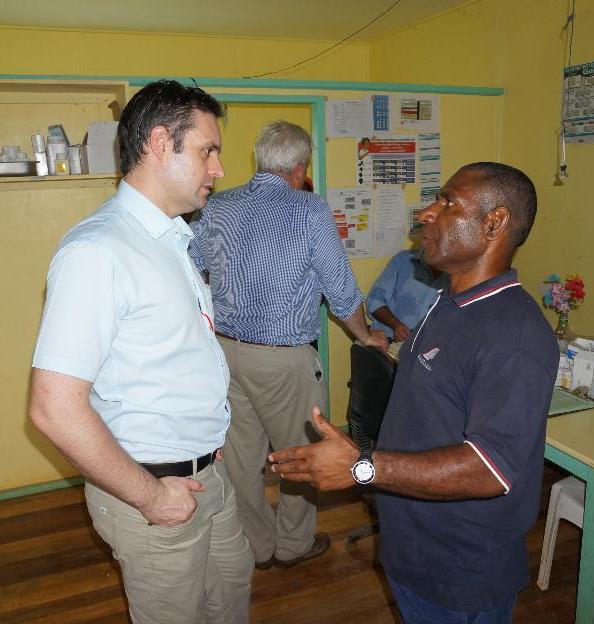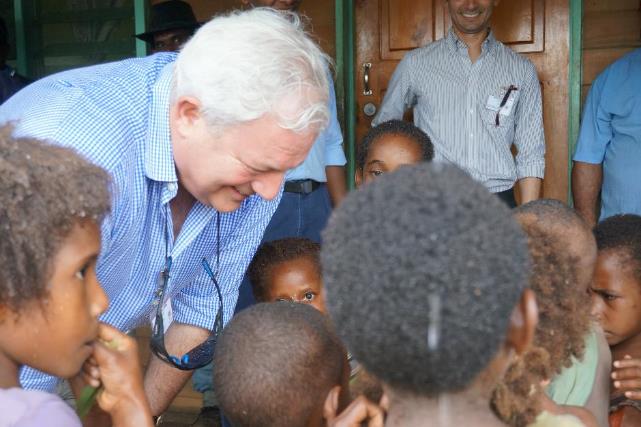 This week I had the rare opportunity to visit malaria control field operations in the remote highlands of PNG, accompanied by British MP and Roll Back Malaria Advocate Stephen O'Brien. During two short days in this beautiful but inaccessible region, I was given cause to reflect on the relationship between aid and trade. My hosts for the trip were oil company Oil Search, a member of the PNG Industry Malaria Initiative which seeks to better align private sector malaria prevention with PNG National Strategy.
This week I had the rare opportunity to visit malaria control field operations in the remote highlands of PNG, accompanied by British MP and Roll Back Malaria Advocate Stephen O'Brien. During two short days in this beautiful but inaccessible region, I was given cause to reflect on the relationship between aid and trade. My hosts for the trip were oil company Oil Search, a member of the PNG Industry Malaria Initiative which seeks to better align private sector malaria prevention with PNG National Strategy.
Private industry is making an increasingly important contribution to the fight against malaria in PNG, which has one of the highest and most intractable burdens in the world. Surprisingly, I started to understand the motivation behind the not insignificant investments made by Oil Search when I asked their Health Foundation’s Strategy Manager, Ross Hutton why there were no armed guards at the

1 Rt Hon Stephen O'Brien MP giving blood for a Rapid Malaria Test
entrance their huge logistics facility in remote Moro area. Ross explained that a long time ago, the company made the decision that they would work
with local communities, and where possible prevent grievances before they occur. The depth of this commitment became quickly clear as we visited a number of clearly poor but well maintained villages, and saw the fascinating work of their malaria field workers. Local women have been trained to administer rapid malaria diagnostic tests, give the most appropriate treatment, and sustain this work by operating micro-stores selling sanitary and other items to local people. After the British Member of Parliament had provided a small blood sample for testing, we were later able to see for ourselves the significant back up system that accompanies these modest service outlets. Oil Search Health Foundation not only provide seed capital and ongoing stock replenishment for these micro-enterprises, but also provide the lab, training and monitoring backup required to tackle malaria at scale.
The results have been impressive with the potential to be scaled-up further. This is particularly important in a context where the PNG Government still struggles to address the disease which in the worst affected areas infects up to 288 per 1000 people annually, killing all too many.
The investment of Oil Search has clearly been a win-win as the company reaps commercial benefits in terms of less lost productivity days from malaria-free workers and better relations with healthier and more prosperous communities. There is increasingly convincing evidence of strong links between malaria and macroeconomic growth1, both via improved workforce productivity and better educational outcomes. For me it raised the question, what is the business case for others to similarly invest? Not just in PNG, but across an Asia Pacific region that has seen unprecedented economic growth but stagnating levels of malaria investment.

The PNG Industry Malaria Initiative provides the rest of the region with an example of how joined up efforts for prevention can identify and implement new delivery mechanisms able to pass the test of a hard-nosed investment decision. The rest of the region now has an opportunity to similarly unite behind a shared vision of dramatic and sustained reductions in a deadly disease that is entirely preventable at very low cost per capita.
At the Asia Pacific Leaders Malaria Alliance Secretariat, hosted by ADB, we believe we have an important role to play in mobilising the regions leadership behind both a shared vision, and a solid business case. Over the coming months we will be working with some of the world’s leading health economists and public health experts to establish a balanced and evidence based case for leaders to consider. Stephen O'Brien will soon be sharing his experiences with other politicians in Canberra. The Asia Pacific Leaders Malaria Alliance (APLMA) is working to engage leaders and others across the region; encouraging them to take a similar interest in the innovation happening in PNG and choose to similarly invest in malaria control and elimination.

Sincere thanks to the Roll Back Malaria Partnership who organised the visit, with some logistics support from Oil Search to whom we also wish to extend thanks.
1Link: Purdy et.al The Economic Case for Combating Malaria
http://www.ajtmh.org/content/89/5/819.full.pdf